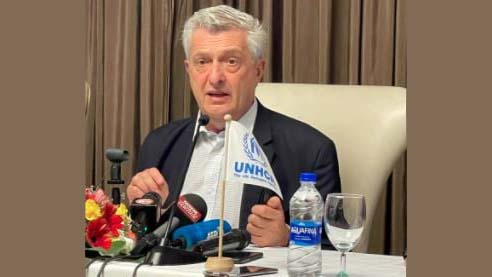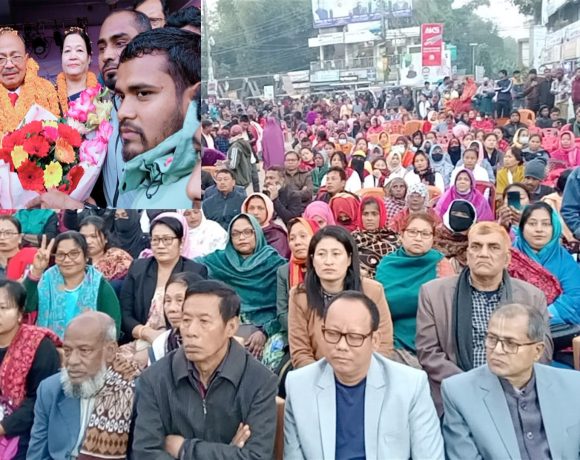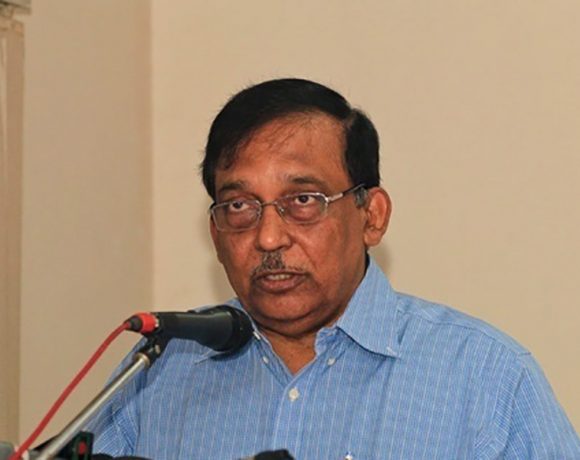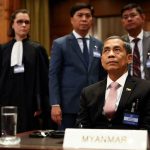UNHCR appeals neighboring countries to care for Rohingyas, like Bangladesh

NEWS DESK
Visiting UN High Commissioner for the Refugees Filippo Grandi has appealed the neighboring countries to retain Rohingyas they have already hosted rather than creating any additional burden to Bangladesh that is sheltering more than 1.1 million displaced people.
“They (neighbouring) should take care of these people like Bangladesh does,” he told a press briefing before wrapping up his five-day trip in Dhaka on Wednesday, May 26, 2022.
Grandi said the numbers of Rohingyas living in other countries are nothing compared to those living in Bangladesh. “So, Bangladesh needs to be relieved of the burden,” he said.
The high commissioner also made appeal to the ASEAN countries plus China, Japan, South Korea to use their influence so that the Rohingyas do not flee to Bangladesh and Myanmar is encouraged to take back their forcibly displace people.
He also urged for sustained and predictable support for Rohingya refugees and their local host communities in Bangladesh, while emphasizing the need to maintain Rohingyas hopes for voluntary return to Myanmar once the situation allows.
“The world must remember the crisis that Rohingya refugees and their hosts have been facing for the last five years. The refugees’ lives depend on how the international community responds in caring for them,” Grandi said who visited Rohingya camps in Cox’s Bazar and Bhasan Char Island during his visit.
Bangladesh hosts some one million Rohingya refugees, most of whom fled for their lives from Myanmar in 2017 while others arrived many years earlier.
Grandi expressed gratitude to Bangladesh and underlined the important strides in the refugee response under the leadership of the Government, including COVID-19 vaccinations for more than 88 per cent of the Rohingya population over 18 years of age.
He said Bangladesh, which has led in assisting nearly a million refugees, remains a priority partner for UNHCR, but continued international support is crucial to provide life-saving assistance and build hope.
“This is why I am here to try to shine a spotlight on Bangladesh, its people, and the Rohingya refugees it has been hosting for decades, and to remind the international community of the importance of their support, including flexible funding to protect Rohingya refugees until they can safely return home.”
The High Commissioner said the solutions lie within Myanmar while UNHCR, the UN Refugee Agency, and UNDP continue to work on community projects in Rakhine state under a tripartite agreement with Myanmar, initiatives must be scaled up and more support is needed to create conditions for voluntary returns in a just, safe, and sustainable manner.
“The Rohingya refugees I met reiterated their desire to return home when conditions allow. The world must work to address the root causes of their flight and to translate those dreams into reality,” Grandi said.
He said skills development and livelihood activities in Cox’s Bazar and on Bhasan Char are extremely important in allowing refugees to build peaceful communities, contribute to a safe environment and support their sustainable return.
Some 28,000 Rohingya have been relocated to Bhasan Char by the Government of Bangladesh, and the High Commissioner observed that essential humanitarian services have been scaled up.
He called for continued strong Government leadership on the island, enhanced education services, skills development and livelihood initiatives.
Humanitarian agencies need more than US$881 million this year to support approximately 1.4 million people, including 920,000 Rohingya refugees in Cox’s Bazar and Bhasan Char, and around 540,000 Bangladeshis in neighbouring communities.
As of May 2022, the Joint Response Plan is only 13 per cent funded.















